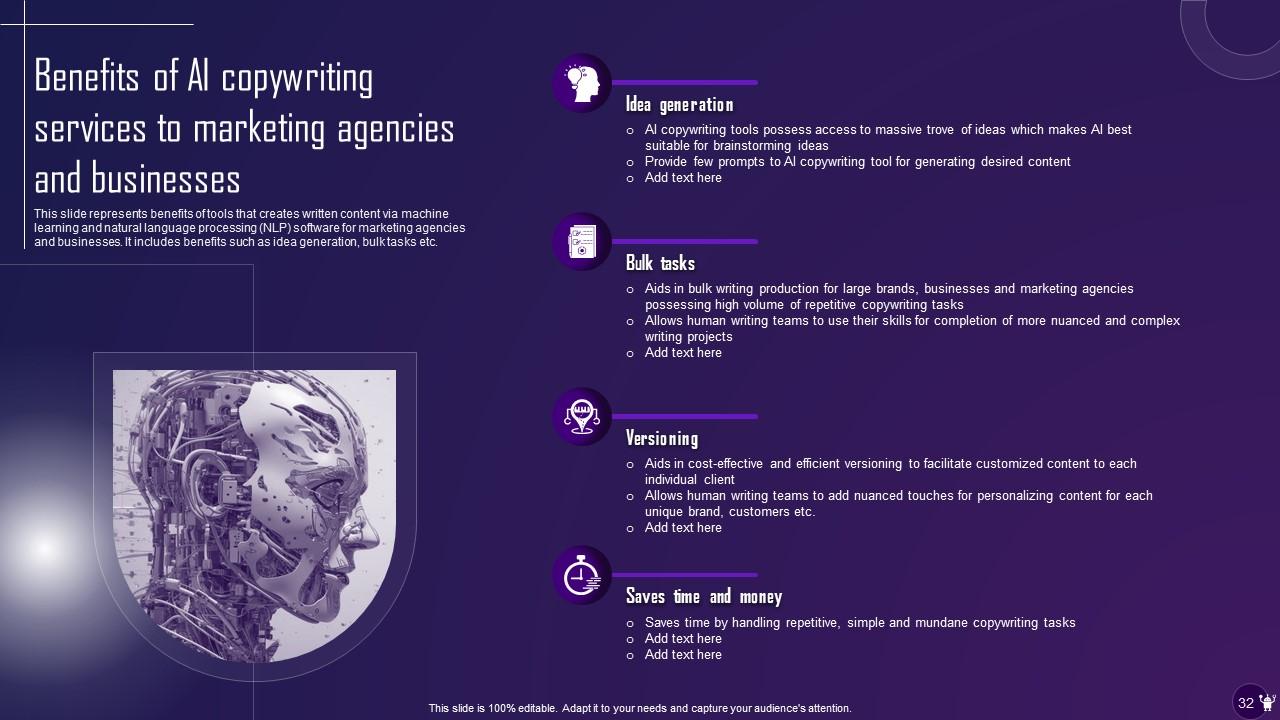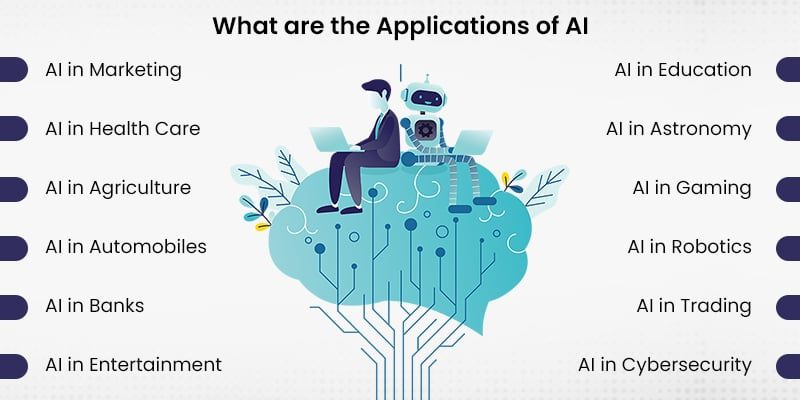Will AI copywriting tools replace human copywriters? Are AI tools here to enhance the creative genius of copywriters or to replace them?
As a copywriter, content marketer, or digital marketer, you might have heard these and many other similar concerns in the last few months.
Of course, with the proliferation of AI copywriting tools and the fact that these tools are becoming more proficient at analyzing text data and generating written content, there’s a legitimate fear that businesses and organizations may increasingly turn to automation, resulting in a reduced demand for human copywriters. For example, when Alibaba’s digital marketing arm, Alimama unveiled its AI-powered copywriting tool some time ago, the company said,
“For merchants, from today onwards, AI can take care of a portion of their copywriting needs. And it significantly changes the way [copywriters] work: They will shift from thinking up copy—one line at a time—to choosing the best out of many machine-generated options, largely improving efficiency.”
Now, that is instructive, but does that mean AI copywriting tools will replace human copywriters?
SHORT ANSWER: No. AI is unlikely to replace human copywriters completely. The fact is, while AI can generate text, it often lacks the creativity, nuance, and human emotions that copywriters possess.
LONG ANSWER: While AI systems still lack the nuance and creativity of human writers, they are putting pressure on copywriters to adapt and evolve. As businesses realize the potential for faster scaling of content at lower costs with AI copywriting tools, they might hire fewer human copywriters, thus affecting job opportunities in the industry. But this presents both a challenge and an opportunity.
In this article, you’ll learn how AI can be a helpful tool for copywriters and why, instead of being afraid of it, you should embrace it. You’ll also learn how these tools work their magic, some real-world applications and outcomes, the role of copywriters in this AI era, and the critical skills you need to remain relevant.
So, whether you're a copywriter, content marketer, or digital marketer who is concerned by the ever-evolving landscape of AI-powered content creation, I invite you to join us as we dive deep into the future of AI-based copywriting and what it means for you.
Let's get started.
Table of Contents
DISCLOSURE: Some links on this post may be affiliate links. This means I'll receive a small commission if you buy anything using such links. There's, however, no extra cost to you. Please do your own research before making any online purchases. Learn more here.
What Are AI Copywriting Tools?

AI Copywriting Tools are software and applications powered by Artificial Intelligence (AI) and Natural Language Processing (NLP) technologies. These tools are designed to assist and automate various aspects of the copywriting process, from generating written content to optimizing it for specific purposes such as SEO and audience engagement.
These tools can craft blog posts, social media updates, advertising copy, website content, product descriptions, and email marketing campaigns, among other forms of written content.
Some of the best AI copywriting tools in the market right now are:
- Rytr – Rytr is one of the top AI copywriting tools. It has gained recognition for its diverse range of applications in the field of content generation. It can generate different types of content, including blog posts, product descriptions, email templates, and more, catering to a wide array of marketing needs.
- ContentBot: ContentBot is a versatile AI writing assistant that specializes in creating marketing and advertising copy. It provides users with AI-generated content suggestions and templates to streamline the content creation process.
- ShortlyAI: ShortlyAI is known for its focus on helping users generate high-quality blog posts and articles. It can assist with brainstorming ideas, outlining content, and even generating full drafts based on user prompts.
- Copy.ai: Copy.ai is a user-friendly AI writing tool that offers a wide range of content generation capabilities. It can assist with creating blog posts, marketing copy, product descriptions, and more. Users can input prompts, and Copy.ai generates content based on the given instructions.
- Writesonic: Writesonic is another popular AI-powered writing assistant. It's designed to help users create content quickly and easily. Writesonic can generate a variety of content types, including ads, blog posts, email subject lines, and social media posts.
The above AI copywriting software programs have become popular in recent months. They boost productivity, aid in content creation, and produce text that is frequently indistinguishable from human-written content.
How AI Copywriting Tools Work

So, what is the AI copywriting method?
The AI copywriting method is a creative process based on the fusion of artificial intelligence (AI) and language expertise. Here's a glimpse into how it works:
- Data Analysis: AI copywriting begins with a deep dive into extensive data, from your brand details to audience characteristics. The AI system scrutinizes this data to understand your unique identity and the preferences of your target readers.
- Language Mastery: Next, the AI dissects language patterns, getting a feel for how your brand communicates and how your audience resonates with specific tones and styles. It learns the subtleties of language, ensuring that the content it produces mirrors your brand's identity while speaking directly to your audience.
- Content Generation: The AI copywriting method's pinnacle is content creation. It employs its acquired knowledge to craft engaging, informative, and persuasive text, aligning it with your specific objectives. It can create a wide range of content, from blog posts to product descriptions.
- Human Input: While AI plays a vital role, human input remains key. The process hinges on the data and guidance provided by human users, ensuring that the AI's content aligns perfectly with the brand's message and the goals of the content.
In essence, the AI copywriting method is a dynamic blend of data analysis, language mastery, and content generation, resulting in high-quality, AI-assisted written content. It offers efficiency and precision, yet retains the touch of human creativity and strategic insight for an optimal outcome.
The Rise of AI in Copywriting

In the not-so-distant past, the art of copywriting was an entirely human endeavor. During those years, the industry relied on the creative skill and linguistic tact of talented writers. However, with the advent of artificial intelligence (AI), the industry has undergone a huge transformation. Today, AI-powered copywriting tools can craft compelling content alongside their human counterparts.
The ever-increasing adoption of AI in copywriting is a testament to the tangible benefits it delivers. Its capacity to streamline and enhance the content creation process, coupled with its ability to generate high-quality and engaging text, has made AI an indispensable tool for businesses and marketers.
For example, according to a report by MarketsandMarkets, the global AI market was valued at USD 150.2 billion in 2023 and is projected to reach USD 1345.2 billion by 2030. That's a remarkable compound annual growth rate (CAGR) of 36.8%!
The driving force behind this astounding growth is none other than the myriad advantages that AI brings to the table in the world of copywriting.
Benefits of AI in Copywriting

The utilization of AI copywriting software is a game-changer for both businesses and individuals who frequently generate substantial amounts of content. Here are some of the several benefits of integrating AI copywriting tools into your content creation and marketing efforts:
- Efficiency: AI-powered tools can generate content quickly, saving time for businesses and content creators. This efficiency is especially valuable for meeting tight deadlines or producing large volumes of content efficiently.
- Cost-Effective: Using AI for copywriting can be more cost-effective than hiring human copywriters. It reduces labor costs and can deliver a good return on investment.
- Consistency: AI ensures consistency in writing style and tone across all content, maintaining brand identity and messaging coherence.
- Accuracy: AI is often more accurate in terms of grammar, spelling, and factual information compared to humans, reducing the risk of errors in content.
- Overcoming Writer's Block: AI tools can help overcome writer's block by providing content suggestions and ideas, aiding human writers in the creative process.
- Handling Repetitive Tasks: AI is excellent at handling repetitive writing tasks such as product descriptions, freeing up human writers for more creative and strategic work.
- Data-Driven Insights: AI tools can analyze data to inform content strategies, identify trends, and improve content based on what works best for the target audience.
- Multilingual Support: AI writing tools can assist in creating content in multiple languages, expanding the reach of businesses in global markets.
- 24/7 Availability: AI doesn't require rest, providing continuous support for content creation and customer engagement.
- Augmenting Human Creativity: While AI aids in content generation, it's not a replacement for human creativity. It complements the work of human copywriters and can help them focus on more creative and strategic aspects of content.
In a nutshell, AI tools streamline content creation, save time and money, maintain quality, and offer valuable support to human writers in various ways, making them a valuable asset for businesses and marketers.
Practical Use Cases of AI Copywriting Tools

As AI-powered tools continue to evolve, they have become an essential part of the modern content creator’s toolset. With AI writing tools, copywriters can now tackle a diverse range of content needs efficiently and effectively. Here are some practical ways these tools can be put into action:
- Content Generation: AI tools excel at producing written content, making them invaluable for creating blog posts, articles, product descriptions, and other written materials.
- Advertising Copy: Marketers harness AI to craft compelling ad copy for online and print campaigns, ensuring messages resonate with their target audience.
- Email Marketing: AI-generated content powers email marketing campaigns, helping businesses engage their subscribers with personalized and persuasive messages.
- SEO Optimization: AI tools aid in optimizing content for search engines. They generate SEO-friendly copy, analyze keyword trends, and fine-tune existing content for better search visibility.
- Social Media Posts: From crafting engaging social media updates to managing content calendars, AI helps maintain a consistent online presence.
- E-commerce Product Descriptions: Online retailers benefit from AI-generated product descriptions that inform and persuade potential buyers.
- Content Summarization: AI excels in summarizing lengthy texts, and condensing complex information into digestible pieces.
- Language Translation: AI tools assist in translating content from one language to another with speed and accuracy.
- Legal and Financial Documents: Law firms and financial institutions employ AI for drafting legal documents, reports, and other industry-specific content.
- Creative Writing: AI isn't limited to business content. It's used in generating fiction, poetry, and creative content, offering inspiration to writers.
These practical use cases of AI in copywriting underscore their versatility and impact across diverse sectors, streamlining content creation, enhancing marketing efforts, and extending the capabilities of writers and businesses.
Real-World Examples of AI in Copywriting
Case Study 1: Creative Ad Campaign
Here are some real-life case studies of using AI in copywriting for a creative ad campaign:
- JP Morgan Chase: The bank used Persado's AI-powered copywriting to improve its ad click-through rates. They saw a 450% lift in CTRs on ads with the help of Persado.
- Heinz: The Company launched an ad campaign with visuals generated entirely by artificial intelligence. The campaign was created with the help of marketing agency Rethink Ideas.
- Whole Foods: The Company leveraged AI for tailored messaging. They used AI algorithms to analyze user data and create personalized messaging that resonated with their target audience.
These case studies show that AI-powered copywriting tools can help businesses create innovative and effective ad campaigns that resonate with customers and improve their marketing efforts.
Case Study 2: Personalized Email Marketing
Here are some real-life case studies of companies that used AI tools to improve their email marketing:
- Draper James: The brand used Retention Science's AI and marketing automation software to convert high-quality leads to paying customers. The software helped them create personalized email campaigns that increased the number of first-time purchases by 10 times.
- eBay: The company used the AI-powered copywriting tool Phrasee to automatically write email subject lines. This allowed their copywriters to focus on building innovative campaigns and making sure any copywriting, human- or machine-written, resonates with customers and stays on-brand. This made the business more efficient and effective.
- FARFETCH: The luxury fashion retailer used Phrasee to manage its email marketing content and saw an increase of 38% in average click rate and a 31% average open rate surge in its trigger campaigns. They captured a unique brand voice and adhered to it consistently.
Again, these case studies show that AI-powered copywriting tools can help businesses create personalized email campaigns that resonate with customers and ultimately improve marketing efforts.
Will AI Replace Human Copywriters?

In the above sections, we have looked at AI copywriting tools, what they are, how they work, and how they have impacted the copywriting industry in recent times. At this point, let’s now tackle the big question: Will AI writing tools replace human copywriters?
As indicated already, we don’t believe that AI tools are poised to replace human copywriters. Instead of replacement, our belief is that they are here to enhance the creative process of copywriters! This belief is borne out of the fact that AI writing tools and human copywriters have their own unique strengths.
To better understand this, let’s now consider the critical aspects of content creation and how these two entities measure up.
1. Automation vs. Human Touch
At the heart of this debate lies the tension between automation and the human touch. On one hand, AI tools offer unprecedented efficiency, generating vast amounts of content in record time. They can tirelessly follow algorithms to optimize content for all types of use cases. The argument, however, is that this mechanical approach lacks the emotional depth, cultural nuances, and creativity that only human writers can infuse into their work.
Nevertheless, these two have their own strengths:
- AI's Strength: AI excels at repetitive tasks, making it an ideal candidate for producing large volumes of content quickly and consistently. It can analyze data at a scale beyond human capability, resulting in precise keyword optimization and data-driven decision-making.
- Human Strength: On the other hand, human copywriters possess the power of creativity and empathy. They can craft narratives that resonate with readers on a profound level, infusing emotion, humor, and cultural relevance into their work. They adapt to evolving trends and shifts in audience sentiment.
To this end, we say that AI copywriting tools and human copywriters don’t have to be adversaries. Instead, the two can coexist and complement each other, with AI handling the routine and data-driven aspects while humans bring in their personalized touch.
2. Quality of Content
- AI Tools: AI can generate content quickly and accurately. It excels at producing grammatically correct, coherent, and factually accurate text. However, it often lacks the finesse and creativity of human writers. AI-generated content may lack the depth, emotional resonance, and unique storytelling that human writers bring.
- Human Copywriters: Human writers are masters of creativity and empathy. They craft content that speaks directly to the reader's emotions, creating a genuine connection. They adapt to the evolving cultural context and industry-specific nuances, infusing personality and authenticity into their work.
For example, an AI-generated product description may provide a detailed list of features, while a human copywriter's version will not only highlight features but also tell a compelling story about how those features benefit the customer.
3. Efficiency and Cost-effectiveness
- AI Tools: AI shines when it comes to efficiency and cost-effectiveness. It can generate content at a rapid pace, which is particularly useful for businesses with high-volume content needs. While there may be initial costs in acquiring AI tools, they can save both time and money in the long run.
- Human Copywriters: Human writers require more time to produce content, and their services often come at a higher price point. However, their ability to infuse content with creativity and a human touch can lead to higher engagement and conversion rates, ultimately providing value for businesses.
The two can cooperate here in that an e-commerce business might use AI to generate product descriptions for a large catalog of items quickly, saving time and resources. However, for a high-stakes marketing campaign, they might turn to a human copywriter to create emotionally resonant ad copy.
4. Consistency and Scalability
- AI Tools: AI is consistent by nature. It can maintain a consistent tone, style, and messaging across a vast amount of content. This scalability is advantageous for businesses with expansive content needs.
- Human copywriters: Maintaining consistency across a large volume of content can be challenging for human writers. It often requires extensive style guides and meticulous proofreading. However, human writers can excel at tailoring content to specific niches or audiences, adding a personal touch.
For example, a global corporation may rely on AI to produce consistent brand messaging across multiple markets and languages. In contrast, a niche publication might prefer a human copywriter who can cater to the unique interests of their audience.
5. Customization and Adaptability
- AI Tools: AI can be customized to some extent, allowing businesses to define parameters, keywords, and styles. However, its adaptability is limited to its programming and training data. It may struggle to handle completely new or niche topics.
- Human Copywriters: Human writers excel in customization and adaptability. They can quickly pivot to cover new topics, adapt to shifts in cultural trends, and adjust their writing style to align with specific brand voices and audience preferences.
For example, when a tech company launches a new product with a highly specialized target audience, they may opt for a human copywriter who can understand the intricacies of the product and speak directly to the audience's needs.
From the above, it's clear that the comparison of the two isn't an either-or proposition; it's about harnessing the strengths of both. While AI excels in efficiency, consistency, and scalability, human writers bring creativity, authenticity, and adaptability to the content creation process.
The Role of Copywriters in the AI Era

As we have seen above, a new era is unfolding in the copywriting industry. The influx of AI-powered tools has transformed the content creation landscape. As expected, copywriters need to evolve with the times to stay relevant since they will continue to play a vital role in the evolving landscape of content creation and marketing.
Here’s the evolving role of copywriters in the AI era and the skills they need to stay relevant.
1. Adapting to AI Tools
Adaptation is the cornerstone of survival in the fast-evolving world of content creation. Copywriters must embrace AI tools as allies rather than adversaries. Here's how:
- Learning the Tools: Copywriters should invest time in understanding the AI tools at their disposal. They must become proficient in using these tools to streamline their work.
- Task Automation: Routine tasks like keyword research and content optimization can be handed over to AI, allowing copywriters to focus on more creative aspects of their work.
- Data-Driven Insights: AI tools provide valuable insights into user behavior and content performance. Copywriters can leverage this data to refine their content strategies.
- Efficiency Gains: AI can generate content faster than humans, enabling copywriters to meet tight deadlines and handle larger workloads.
For example, a copywriter tasked with creating product descriptions for an e-commerce website can use AI to generate the initial drafts quickly. This allows them to spend more time fine-tuning the content for a human touch.
2. Collaborating with AI Systems
The synergy between humans and AI is where the true magic happens. Copywriters can collaborate effectively with AI systems to harness the best of both worlds:
- Content Ideation: AI can assist in generating content ideas based on trends and audience interests. Copywriters can then refine these ideas, adding their unique perspective.
- Editing and Proofreading: While AI can catch grammatical errors, copywriters excel at ensuring the content flows smoothly and resonates with the target audience.
- Tone and Style: Copywriters can guide AI in adopting the desired tone and style for a specific project or brand, ensuring consistency in voice.
- Quality Control: Copywriters play a vital role in ensuring the final output meets high-quality standards and aligns with the brand's messaging.
For example, a digital marketing agency can use AI to generate the initial drafts of blog posts for clients. Copywriters step in to add industry-specific insights, personality, and a compelling narrative to make the content truly shine.
3. Maintaining the Human Element
In a world where automation is prevalent, the human element in content remains invaluable:
- Creativity: Copywriters possess the ability to craft narratives, evoke emotions, and tell stories that resonate with readers. AI lacks the depth of human creativity.
- Empathy: Copywriters can empathize with their audience, understanding their pain points, desires, and motivations. This empathy drives content that truly connects.
- Cultural Sensitivity: AI may not fully grasp cultural nuances, but copywriters can ensure that content respects cultural diversity and avoids potential pitfalls.
- Authenticity: Authenticity is the hallmark of great content. Copywriters infuse authenticity into their work, building trust with the audience.
For example, a healthcare copywriter can write an article about a medical procedure, infusing it with empathy for patients' concerns and addressing them in a reassuring manner.
4. Skills Copywriters Need to Stay Relevant
To thrive in the AI era, copywriters should cultivate a diverse skill set:
- Creative Writing: Enhance creative writing skills to produce engaging and compelling narratives that resonate with the audience.
- SEO Mastery: Acquire expertise in SEO to optimize content effectively for search engines, even when collaborating with AI for keyword research.
- Data Interpretation: Develop the ability to interpret data insights provided by AI tools to refine content strategies.
- Cultural Awareness: Stay attuned to cultural and societal shifts to create content that remains relevant and respectful.
- Tech Savviness: Familiarize yourself with emerging AI technologies and platforms to adapt quickly.
For example, a copywriter working in the fashion industry should not only understand fashion trends but also grasp how AI can analyze consumer behavior to inform content decisions.
From the above, we can see that the role of copywriters in the AI era is one of adaptation, collaboration, and innovation. Embracing AI tools as partners rather than replacements, copywriters bring their unique blend of creativity, empathy, and authenticity to the table.
Frequently Asked Questions (FAQs)
Is AI writing better than human writing?
AI writing excels in certain aspects, such as efficiency and scalability. It can produce content quickly and consistently. However, it often lacks the depth of human creativity and emotional resonance. Whether AI writing is better depends on the specific content needs and goals.
Can AI replace human copywriters?
AI can handle certain aspects of copywriting, like generating initial drafts and optimizing for SEO. However, it struggles with creativity, empathy, and storytelling. The best approach is a collaboration between AI and human copywriters, rather than a complete replacement.
Are AI copywriting tools worth it?
AI copywriting tools can be worth it for businesses with high-volume content needs. They can save time and resources while maintaining consistency. However, the value depends on the specific goals and quality standards of each business.
Why can't AI replace writers?
AI struggles to replicate the depth of human creativity, emotional connection, and adaptability. It lacks the ability to understand cultural nuances, context, and the intricacies of storytelling, which are essential in effective copywriting.
What are the problems with AI copywriting?
Some common problems with AI copywriting include issues with maintaining a human tone, producing content that lacks depth and authenticity, and occasional grammatical errors. Ethical concerns about content generation and plagiarism also arise.
Will AI destroy creative writing?
AI will not destroy creative writing but rather transform it. While AI can handle certain aspects of content creation, it cannot replace human creativity. Instead, AI can enhance efficiency, leaving human writers with more time to focus on creativity and storytelling.
Is copywriting still profitable with AI?
Copywriting remains profitable even with AI. Businesses still value human creativity and the ability to craft compelling narratives. Copywriters who adapt, collaborate with AI tools, and focus on creativity can continue to thrive in the industry.
Take Away: Will AI Replace Human Copywriters?
As the debate surrounding AI copywriting tools versus human copywriters rages on, it is clear that AI, as impressive as it is, will unlikely replace human copywriters anytime soon. While AI can certainly churn out text efficiently, it often stumbles when it comes to weaving the threads of creativity, emotional resonance, and strategic thinking that human copywriters exert with skill.
It's clear therefore that each side brings something unique to the table. AI excels in producing content quickly and cost-effectively, making it an invaluable tool for businesses with high-volume content needs. Human copywriters, on the other hand, are masters of creativity and empathy. They craft content that forms genuine connections with readers, adapting to evolving cultural contexts and industry-specific nuances. Their work is marked by authenticity, qualities that are hard for AI to replicate fully.
This being so, instead of seeing AI as a threat to human copywriters, we should embrace it as a powerful partner. The coexistence of AI and human creativity is where the true potential of AI-powered copywriting lies. AI can handle repetitive and time-consuming tasks, such as generating initial drafts and optimizing for SEO, freeing up human copywriters to focus on what they do best—creating content that captivates, engages, and resonates with audiences.
Your turn: Do you think AI copywriting tools will replace human copywriters or, do you agree with our submission? Share your thoughts with us in the comments below.







